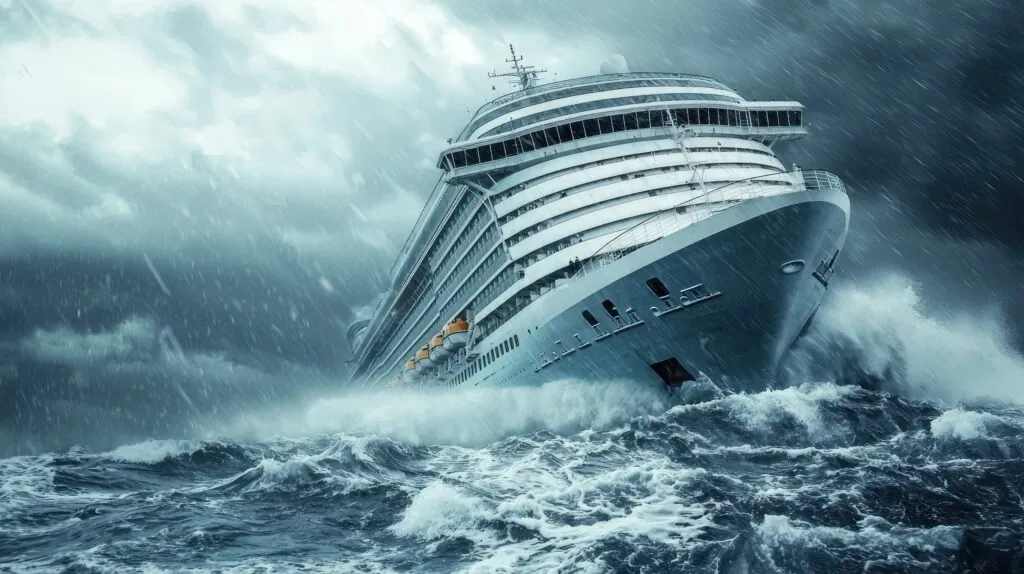The Reporting Process for Sexual Assault on International Waters
Cruise vacations offer a unique escape from everyday life, but when a serious crime such as sexual assault occurs on board, especially in international waters, survivors are often left confused, scared, and unsure of what to do next. Legal procedures can become especially complicated due to overlapping jurisdictions, ship flag states, and variable levels of law enforcement cooperation.

This guide provides a thorough breakdown of how to report sexual assault at sea, outlines the steps victims should take, and explains the legal and procedural complexities surrounding jurisdiction and flag state responsibility.
Understanding the Complexity of Jurisdiction at Sea
What Is Maritime Jurisdiction?
Maritime jurisdiction refers to the authority that nations or organizations hold over ships and their passengers on international waters. A vessel sailing more than 12 nautical miles from any coastline is considered to be in “international waters.” In this area, no single country has sole sovereignty — instead, the ship operates under the legal system of the country in which it is registered. This is called the “flag state.”
Who Has Legal Control in These Waters?
The flag state has the primary legal jurisdiction over crimes committed on board its registered vessels. This means that, for example, if a ship is flagged under the Bahamas, the laws and law enforcement agencies of the Bahamas have the initial right to investigate and prosecute any criminal behavior that occurs while the ship is on the high seas.
When Do Other Jurisdictions Apply?
Other jurisdictions may also become involved, particularly:
- The country where the ship docks after the incident
- The home country of the victim or perpetrator
- The country where the cruise line is headquartered
These overlapping authorities can create delays, miscommunication, and, in some cases, a failure to adequately investigate the crime.
What to Do Immediately After a Sexual Assault on a Cruise Ship
Step 1: Prioritize Safety
First and foremost, victims should prioritize immediate personal safety. If you are in danger, move to a secure area and find someone you trust or contact the ship’s security team. Cruise ships typically have designated personnel responsible for handling emergency and criminal incidents.
Step 2: Report to Onboard Security
Next, report the incident to onboard security authorities. Ships are required under various national and international regulations to have reporting mechanisms in place. Demand to speak with a security officer or medical professional who can help initiate the official process. Make it clear that you want the incident documented and that you expect it to be reported to law enforcement.
Step 3: Request Medical Attention and Preserve Evidence
Request a forensic medical examination, if one is available. Medical care can treat injuries and provide critical documentation of the assault. Do not bathe, change clothes, or clean up before this exam, as doing so may destroy key forensic evidence.
Step 4: Document Everything
Write down everything you remember about the incident. Include time, location, the name or appearance of the perpetrator, what was said, whether alcohol or drugs were involved, and the names of any potential witnesses.
How to Officially Report a Sexual Assault on a Cruise
1. Reporting Onboard the Ship
Onboard cruise security departments are the first line of response. While most ships are required to maintain a process for handling criminal complaints, the level of professionalism and training among security personnel varies significantly.
2. Reporting at the Next Port of Call
Once the ship docks, you can report the incident to local port authorities. These officials often have more resources and authority to take legal action than ship personnel.
3. Contacting National Investigative Agencies
If you’re a U.S. citizen or the ship docks in the United States, you can report the assault to the FBI, which has jurisdiction under the Cruise Vessel Security and Safety Act. Survivors from other countries should reach out to their respective embassies or consulates for guidance.
Flag State Responsibility and Legal Loopholes
What Are Flag States Supposed to Do?
Flag states are legally responsible for ensuring that:
- Crimes are reported and logged properly
- Victims receive medical and legal support
- Investigations are initiated according to international law
- Cruise lines operating under their flags follow safety and reporting protocols
The Problem with Flags of Convenience
Many cruise ships are registered in countries with lenient regulatory oversight, known as “flags of convenience.” These registries may lack the legal structure or political will to pursue justice in crimes involving foreign nationals. As a result, survivors often encounter legal dead ends.
Victim Rights After a Maritime Sexual Assault
Core Legal Rights of Victims
Survivors are generally entitled to:
- Confidential medical care
- A forensic medical exam
- A copy of any filed incident reports
- Legal information and advocacy support
Legal Protections in the U.S.
In the United States, the Cruise Vessel Security and Safety Act (CVSSA) mandates security upgrades and legal transparency on cruise ships, including video surveillance, access to trained medical personnel, and mandatory reporting to the FBI.
The International Reporting Chain of Command
How Investigations Are Structured
Reporting a maritime assault often involves a complex web of agencies. Here’s how the typical reporting chain flows:
- Report to onboard personnel
- Evidence collected by ship medical or security staff
- Notification of the flag state’s legal authorities
- Notification of local port officials at next docking location
- Involvement of international law enforcement if applicable
Why This Matters
Each step introduces a risk of delay or error. Victims should always request documentation at each stage and demand confirmation of which entities have been notified.
What Happens After the Report?
Investigation and Legal Action
Depending on the case, the flag state or local authorities may open an investigation. The perpetrator may be detained or questioned, but prosecution often depends on the strength of the evidence and the willingness of the involved jurisdictions to pursue legal action.
The Importance of Legal Support
Engaging a maritime or international crime lawyer early in the process can be pivotal. A legal professional can guide the victim through which court systems apply and what evidence will be considered admissible.
Common Issues Victims Face
Gaps in Process and Protection
Despite existing laws, survivors frequently experience:
- Inadequate medical care on board
- Poor training among cruise staff
- Delays in reporting to appropriate authorities
- Conflicting jurisdictional responses
- Lack of access to legal aid or victim support
These issues can discourage survivors from reporting the assault or pursuing legal remedies.
Summary: Steps to Report Sexual Assault at Sea
- Move to a secure location and seek immediate safety.
- Notify cruise ship security and insist on a formal incident report.
- Request medical care and preserve all possible evidence.
- Contact port authorities or your home country’s law enforcement upon arrival.
- Engage a legal professional to protect your rights and assist with the case.
Frequently Asked Questions
Can I press charges for an assault that happened in international waters?
Yes, you can press charges, but the process depends on multiple legal factors. The country that has jurisdiction over the incident is usually the flag state—the nation under whose registry the ship operates. However, your home country or the country where the ship docks may also become involved, depending on international treaties, the cruise line’s registration, and whether national laws extend to citizens abroad. A legal expert in maritime law can help determine the appropriate jurisdiction and guide you through filing charges.
Does the country the ship is registered in really matter?
Absolutely. The flag state holds primary jurisdiction over any crimes committed on board while the vessel is in international waters. This means the quality and responsiveness of law enforcement, the transparency of investigative procedures, and the legal rights afforded to victims can vary drastically based on the country where the ship is flagged. Unfortunately, many cruise ships are registered in countries with weak enforcement mechanisms, making the role of the flag state critical in how the case is handled.
Will the cruise line report the incident automatically?
Not always. While some jurisdictions, such as the United States, require cruise lines to report serious crimes like sexual assault to authorities like the FBI and Coast Guard, this is not a global standard. In many cases, cruise staff may try to handle the issue internally or discourage formal reporting to avoid liability or negative publicity. It is crucial to insist on official documentation and seek legal help to ensure the incident is reported through the appropriate legal channels.
What if ship personnel don’t take my report seriously?
If your complaint is ignored, minimized, or inadequately documented by cruise personnel, do not give up. Keep your own detailed records of the interaction, including names, titles, and statements made by ship staff. As soon as you reach port, report the assault to local law enforcement and contact your country’s embassy or consulate. You also have the right to report directly to agencies like the FBI if the cruise is U.S.-based. Retaining legal counsel early can help you navigate these complications and ensure your rights are upheld.
How can I ensure evidence is preserved for an investigation?
Preserving evidence starts with not altering your appearance after the assault—avoid bathing, changing clothes, or cleaning the area where the assault occurred until you have received a forensic exam. Request medical attention from qualified personnel on board or ask to be examined at the next port. Insist that the ship’s security team documents the scene and logs the incident. Get copies of any written reports or statements you make. These steps are essential for strengthening any future legal case.
Contact The Cruise Injury Law Firm Today
Navigating a sexual assault case on the high seas is emotionally and legally overwhelming. The complex web of maritime law, varying levels of enforcement, and jurisdictional challenges can make it difficult for survivors to seek justice.
If you or someone you know has been assaulted aboard a cruise ship, you do not have to face it alone. Legal guidance is crucial to ensure that your rights are protected, evidence is preserved, and the responsible authorities are held accountable.
Contact The Cruise Injury Law Firm today to get the support you deserve and take the first step toward justice.






